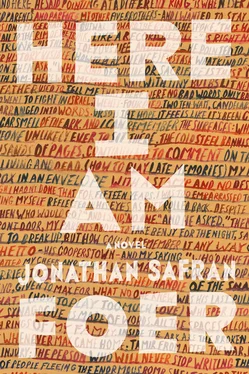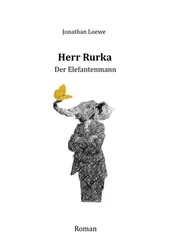Compounding Julia’s irritation was the fact that Mark and Jennifer were the parents of one of Sam’s friends, and thought of Jacob and Julia as their friends, and wanted to have a coffee after to “catch up.” Julia liked them and, insofar as she could muster enthusiasm for extrafamilial relations, considered them friends. But she couldn’t muster much. At least not until she could catch up with herself.
Someone needed to invent a way to be close to people without having to see them, or talk to them on the phone, or write (or read) letters, or e-mails, or texts. Was it only mothers who understood the preciousness of time? That there was none of it, ever? And you can’t just have coffee, even and especially not with people you rarely see, because it takes half an hour to reach the café (if you’re lucky), and half an hour to return home (if you’re lucky again), not to mention the twenty-minute tax you pay just to get out the door, and a quick coffee ends up being forty-five minutes in the Olympic scenario. And there was the horrible rigmarole at Hebrew school that morning, and the Israelis were coming in less than two weeks, and the bar mitzvah was saying its goodbyes in the ICU, and while it’s entirely possible to get help, help feels bad, help shames. One can order groceries online and have them delivered, but that feels like a failure, an abdication of motherly duty — motherly privilege. Driving farther to the store with good produce, selecting the avocado that will be perfectly ripe at its moment of use, making sure it doesn’t get crushed in the grocery bag and that the grocery bag doesn’t get crushed in the cart … it’s a mother’s job. Not job, but joy. What if she could accomplish the job but not the joy?
She never knew what to do with the feeling of wanting more for herself: time, space, quiet. Maybe girls would have been different, but she had boys. For a year she held them against her, but after that sleepless holiday she was at the mercy of their physicality: their screaming, wrestling, table drumming, competitive farting, and endless explorations of their scrotums. She loved it, all of it, but needed time, space, and quiet. Maybe if she’d had girls, maybe they’d have been more contemplative, less brutish, more constructive, less animalistic. Even approaching such thoughts made her feel unmotherly, although she always knew she was a good mother. So why was it so complicated? There were women who would spend their last pennies to do the things she resented. Every blessing that was promised the barren heroines of the Bible had fallen into her open hands like rain. And through them.
i want to lick the cum out of your asshole
She met Mark at the hardware gallery. It was elegant, and it was obnoxious, and in a world where the bodies of Syrian children washed up on beaches, it was unethical, or at least vulgar. But her commissions added up.
Mark was already handling samples when she arrived. He looked good: a tightly cropped, gray-dusted beard; clothes that were intentionally snug and not bought in sets of three. He had the physical confidence of someone who doesn’t know within one hundred thousand dollars the contents of his bank account at any given moment. It wasn’t attractive, but it wasn’t ignorable.
“Julia.”
“Mark.”
“We seem not to have Alzheimer’s.”
“What’s Alzheimer’s?”
Innocent flirtation was so revitalizing — the gentle tickling of language that gently tickled one’s ego. She was good at it, and loved it, always had, but grew to feel guilty about it in the course of her marriage. She knew there was nothing wrong with such playfulness; she wanted Jacob to have it in his life. But she also knew of his irrational, uncontainable jealousy. And frustrating as it could be — she never dared to mention a romantic or sexual experience from her past, and needed to overclarify any remotely misinterpretable experience in the present — it was part of him, and so something she wanted to care for.
And it was a part of him that drew her in. His sexual insecurity was so profound, it could only have sprung from a profound source. And even when she felt that she knew everything about him, she never knew what created his insatiable need for reassurance. Sometimes, after deliberately omitting something innocent that she knew would upset his brittle peace, she would look at her husband with love and think, What happened to you?
“Sorry I’m late,” she said, adjusting her collar. “Sam got in some trouble at Hebrew school.”
“Oy vey.”
“Indeed. Anyway, I’m here. Physically and mentally.”
“Maybe we should go get that coffee first?”
“I’m trying to quit.”
“Why?”
“Too dependent on it.”
“That’s only a problem if there isn’t coffee around.”
“And Jacob says—”
“That’s only a problem if Jacob’s around.”
Julia giggled at that, unsure if she was giggling at his joke or her girlish inability to resist his boyish charm.
“Let’s earn the caffeine,” she said, taking a too-distressed bronze knob from his hand.
“So I have some news,” Mark said.
“Me, too. Should we wait for Jennifer?”
“We shouldn’t. And that’s my news.”
“What do you mean?”
“Jennifer and I are getting divorced.”
“What?”
“We’ve been separated since May.”
“You said divorced .”
“We’ve been separated. We’re getting divorced.”
“No,” she said, squeezing the knob, further distressing it, “you haven’t.”
“Haven’t what?”
“Been separated.”
“I would know.”
“But we’ve been together. We went to the Kennedy Center.”
“Yes, we were at a play.”
“You laughed, and touched. I saw .”
“We’re friends. Friends laugh.”
“They don’t touch.”
Mark extended his hand and touched Julia’s shoulder. She reflexively recoiled, eliciting a laugh from each of them.
“We’re friends who were married,” he said.
Julia organized her hair behind her ear and said, “Who still are married.”
“Who are about not to be.”
“I don’t think this is right.”
“Right?”
“Happening.”
He held up his ringless hand: “It’s been happening for at least long enough to erase a tan line.”
A skinny woman approached.
“Anything I can help with today?”
“Maybe tomorrow,” Julia said.
“I think we’re OK for now,” Mark said, with a smile that appeared, to Julia, as flirtatious as the one he’d given her.
“I’ll just be over there,” the woman said.
Julia put down the knob with a bit too much force and picked up another, a stainless octagon — ridiculously effortful, repulsively masculine.
“Well, Mark … I don’t know what to say.”
“Congratulations?”
“Congratulations?”
“Sure.”
“That doesn’t feel right at all.”
“But it’s my feelings we’re talking about here.”
“Congratulations? Really?”
“I’m young. Just barely, but still.”
“Not just barely.”
“You’re right. We’re resolutely young. If we were seventy it would be different. Maybe even if we were sixty or fifty. Maybe then I’d say, This is who I am. This is my lot . But I’m forty-four. A huge portion of my life hasn’t happened. And the same is true for Jennifer. We realized we would be happier living other lives. That’s a good thing. Certainly better than pretending, or repressing, or just being so consumed with the responsibility of playing a part that you never question if it’s the part you would choose. I’m still young, Julia, and I want to choose happiness.”
Читать дальше












